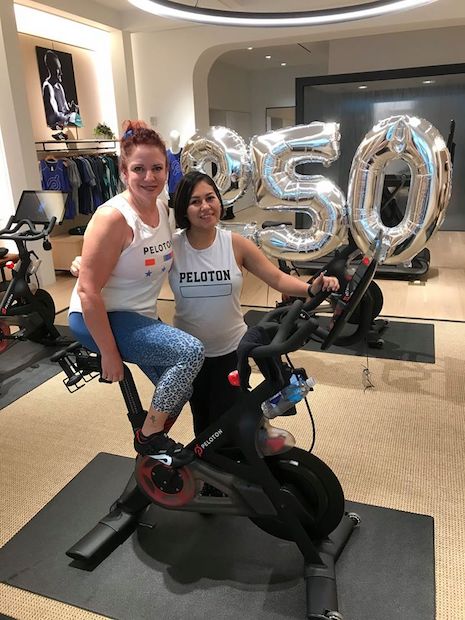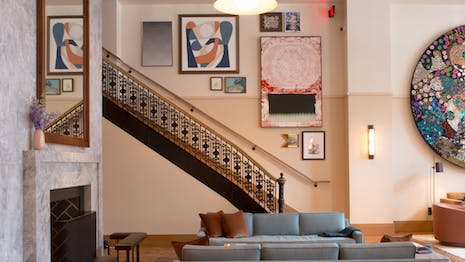NEW YORK – As retail becomes more about the experience, companies are no longer bound by traditional category definitions, allowing them the opportunity to branch out and create a broader lifestyle around their brand.
During a session at NRF’s The Big Show on Jan. 14, executives from Shinola and Peloton explained how they have both translated their respective brands’ value propositions into offerings that go beyond the product towards community building and long-term engagement. As companies build lifestyles around their products, the key consideration is staying on brand to not extend too far.
"We’re seeing an interesting crossover, and we have this extraordinary opportunity now as customers move across this landscape of experiences quite fluidly and mostly being aided by their digital devices to find some fabulous opportunities to capture customers in the crosswalk, those in-between phases where they may not have had an opportunity to connect with brands, but now they do," said moderator David Kepron, vice president of global design strategies, premium distinctive brands at Marriott International. "Brands are living outside their comfort zones."
Lifestyle push
Shinola began in Detroit in 2011 as a watchmaker, and has since extended to categories including leather goods, turntables and bicycles (see story). After developing a community of loyal customers and seeing the positive reaction to its store environments, Shinola made the decision to move into hospitality.
When it came time to open its first hotel, Shinola chose a location in its hometown. In a nod to the community, the art chosen for the property comes from local talents.
Touches throughout the interior design point to Shinola’s designs. For instance, faucets made in partnership with Waterworks mimic the case backs on watches, while hallways have arches that call to mind the curve of a turntable.
The hotels are designed to feel like a home, or as if Shinola is inviting consumers into its living room.
Shinola is looking at sites for other hotels. In another homey move, the company is also investigating how it can become a greater part of consumers’ home environments.
The company’s CEO/president Shannon Washburn explained that Shinola’s extensions are guided by whether they feel true to the brand.
Also taking a lifestyle approach, Peloton launched with a positioning based more around its digital media than its bicycles.

Peloton owners will often visit stores to celebrate milestones, such as the 250th ride. Image credit: Peloton
Translating this to the retail environment, Peloton’s showrooms are light on product. The bricks-and-mortar spaces include the opportunity to touch, feel and ride the stationery bikes, but they also serve as a place for community building.
The brand's senior vice president of retail Jennifer Parker explained that consumers will sometimes take over a store to hold a party. Peloton also hosts meet-and-greets with some of its trainers, taking a digital face into the physical realm.
Peloton recently rolled out a new showroom concept in Cleveland, OH that aims to further the brand’s positioning as more than a bike company. The space includes a private area where consumers can try out bicycles, complete with showers.
Community is key
Beyond Shinola, other brands including Equinox and even Taco Bell have made forays into hospitality.
Located at 35 Hudson Yards, Equinox’s first hotel is intended to provide guests with a “360-degree lifestyle travel experience” with soundproof rooms, access to fitness classes and healthy eating (see story).
Luxury brands can work relentlessly to develop a quality product, but without creating a controlled experience and consistent message around their merchandise and identity, there may be a disconnect between reality and public perception.
During the “Going Beyond the Product: Creating Physical Experiences for Luxury Consumers” session at Luxury FirstLook: Strategy 2016, panelists agreed that finding one consistent brand personality and ideology and communicating that across all touch points, whether online or in-store, is the key for effective brand positioning. From there, letting consumers engage with a brand through product, entertainment or creative experiences can further help to build a community (see story).
Sometimes translating the DNA of a store experience to less transactional environments is natural.
"From the very beginning in our stores in Detroit…guests would come in and they loved the environment, they loved the beautiful details and just the experience of being there and quite honestly, it was about inviting them into our home, and wanting to tell them about the brand and share the brand values and what we are about," Ms. Washburn said. "And I think from there we saw a real connection with our guests.
"If you think about it, training for the stores or training in a hotel, it’s all about creating amazing, quality interactions at every touchpoint with the consumer," she said. "As a brand we live, eat, breathe quality."
{"ct":"P6LmJaAHZextrxleZWIYzB96HNNryY7\/sfbHlp\/0\/mWTO0pVuVtFm+ObL3sVX4p1ax6eLNcz3lgcBEpkx47UHnj3ZMg\/zhORaCPWzb4arkFu6wAR9lAmxnYlMtwG9mDRgYmcYULFo\/1DA3ZVbmS+JAkxleQbHGuz6xPVllZbsP3gfwPzJTe3ZWTQTFkRvw+4y2pd8DxTlB9NNrmLkV+TrjPvAz2abLhWTfFkj1+T+WcI5uj39V5twUCZcxdaDUDjUXMQoH\/EShJPJ\/m3rpwEQoCBfT+tdd2CuWs5FbgQVqfcsx\/9VYuGN\/ZpY7CzPC1SkVURagH6VM3GKFStIC1+RehLNqD2ZKnigwYZUQVuuGhBb8MF2sQLCQ1lIOK\/DY4kT5HMA15o0ffJsP9S7kCXUkU+bXfH\/BDxj9xikOeD5OAt8oPRIUBINBOLTl4TxaKYJV4JaDB2grt3CKHE9IZVnbiZ9wCexDMxdYGsekoZh7eK67ipB2+VBQyFslADfy+sujn7hcOoo\/UAIqPZsnsE0UqVgBBON4JF44mVIa22vTis4APlPUvqrF6PG2sM7ZTOtkthW\/T2IGkaIUh8f2IINkxLda2oLZ9ooyG7P\/Iyb9hDONc4XywIitj1pJx7noWQqv\/zJGsq+trN0ihENMXgoiTiKqQrAJ4NEfIxI4pXK4N\/ox9TSDFcIcKXfkJuOATBL66Rh0IWDM85MrTL9Mr\/XmPoqw25968pyV3T0b1xqZJ01J\/+bXJ8RA+IWdLFB9QfdwSWXxe633qAWAaO\/VIt\/q\/Xan4QFhKIKHoYbG8mko18AhVj6Cx0sZnvqet8xSC9slHWqKcSFNNJ3Uw0SYKbGmDsYMB5xA+7OS89+rDoCnBkfdb08i0mUr3HFZl42oah+q2IVqJmMRyGxxpFSiMQ3vOqH\/8qACNzsM8xt5NV+7MJvsfbITvK7qZJKfIStPxvXzLsvWEY+nYRaX+pIkVrNynK5mcLZ2YlD7G5YwiMCu5p21EGkI372K42cEG6AKvr0deLzarcY4dRMYtgfm3jY6S5K\/X1Ui0mhy6VS\/sBqnxhnOr+ajc1QY897JMVzLDVavFyW78UjKHRQZ+RL8WUB6nKmAVHocI7lUvAWFavS0rr412AuAlT92vTpdJDulXAgToxBPc7lUmgit0d4QVB5pin840FQX7AwZe\/0\/2q0DXEPAknaX82Yd186h8miFGGU\/BcfsH1\/I\/WtTUt30yHh51SJceNAHEGTQm9hqd1VnFA7\/Areta\/EUeqIsn6Rci3Ia+SB10pryT8htPhMyvq1xvteCIlC9iKp2WdCHMAQq2mj3Ne+joom6Ol7B\/7EGXPwFR6CMPLCv7dV95+rqo0xIVHdhYZNmgmM+4i+gCQ7qbxNST4cRfx4BZOF4lv4x2Rw9bkskRe7umpvx8gsMlBA\/O9RPsrOKkiyHLeQy2wVwVIkD4JJhcSjE8CijpI5Fp+A1eU2fkbyFYPHSkNXKVkuFHHTtp\/ucpuFX2V9TCuJBGpIoRTM21Az6S8eSsfR0k20Rl3yAfIhxwZsAZWwDp8YZjsdb7hmCw73eVdwxfDxJaSR1\/RL6c5XP+gSYNSeK8NbxGJLuhPmsnxvL1PiOymOP9o3Wh8qYJbi1KY+BIF+r\/qdnOFU+LxD+\/NQagcF1UGUvRY30ZqyY9qgjMffyCoCeL4PTjHBXw9cwT0kgzjVnC5jXZ9bPxvEXu6skUv\/3MBKD4YE4x\/zqGuUOTIYZ9uLZedRn+Ub7sVWHpokJUMN50W64UxFf9ZsshzJ3GRmAX0NcoM8fMfDrSqkM1zx2Y9FMBmDtlODKrTbvouvl48J\/U2WNTkFs7ePIjyzWnNqTFkBA0Oepdi9hYa75QQOpQD4fcAvrt2HLjvY0uOvF\/r\/jw2JmafbZm\/l6qi53p1f1R47\/k38XkRat8ojKFu590\/yccaxuoTTsFHai2H8LKyXm3J\/REqIUHy+MrRrxqZbW7cFd85zW\/lQy5bV+eBOGV7vZi\/XuDB7EkLRi10IFR3vaGAPwzq2bZWbrvdPHWcbkXFYYDOrliI5309UIBpCMmEuemL2+LEE8ANRhCOR3TZUUThsVnH9w59hWFm6IBxOLLVIr4ZoTJFlUpc2Umd9DDawvdm9TCIz2VvVjdI185x1x6rmkpi1SLhEMdsIT8SDG0ojbyLbKF3lraNxXK7akVGDDZsngnKWQsYL6eaXv1LzF+PbjNW9yeq2RXk8Cr+VmUk5W1kvdTYszR6uwMy54AV1LScqzATyl0AfY8yo1DHbQuCCl1IncBmRS2j4fQBGyA3r92kD8anSEHmM4U6kBYndkekJLnii0ZBNUpp25j7ulXVCrnSupWR7Y\/XbhC04mZfl8MzvoKt+aRQfEbFnpvQs5ExPdFrT5cE\/+kvMZSs4PYIPSYKuNRNPUpdWwF6lXGOyhlz\/LsQTEDpiUhhm+GaVp7Sx+iDOtP\/d\/Q+uP2koeqWmiZvjgdrzoYh\/GEGjFF7nUEms2nbwwvsdfcZgAZEx9CMDQP6EHTtoPTZt\/QQ61NaKfq0N+3qWeniMQsS9cokgyAbixdRrnJTd371P8\/iWr4Vij\/Trb1Sf2eVAUzmCxTSwyz0YHG5zYQJ60R\/pzm2n9X6oOYk1aXPG+znn\/vEN9zT3nRVGad\/sKvbGvsUCBxRYcjtI9jabeGvdStZcmixSf1fabD44HCcVxX5xQPma5CxmRbWmGoaFd7toNNPlJNV3ftvAZ4gGgGPN2N6nUArx6O8Bdf3rOigTTGsv\/fE54gioZO2HMKaTkqKMTaF0j84YzSO8ugkVMRR3HrLOEEgelzt\/fG28bQ0STQuoIuyQAGU8IPBKpJ\/1bCauerJPBa5BqQMHcCOn9zp1zD0TXhJ1\/ER8Nt6zE9MbfZdXvHgSY26Qv81byPqk7rOXxxUWzDV2tPhtCFtRZqafrxxnnzGxkov8Ue\/ny56alynpkQvdi4RbLW6NOneHHsYEBpXt8G4WMrWGkAZz22LmOr7OCrzxRJdDwtM9VRM9VbgZdC+E+Z12ynwSn1aRnyIt6TBfRoB1IByJ\/CS0SxD0aunqHhsZXxnPKnBDjSl\/p\/iOPldzgxfbMwPY8CbGeixbgbJ3dAxhdXUlZQQbJMKNg56KlJa6yE0vfVi55gDMf7pSGrNqazmPYa2JKkg+mEJITsTavmXu0MiEEwhyBs0RkU6H562QypNEgWEowOpOV9pEuJ3NV+BdHf7zVEtkSj20qVD\/z0OqquM7\/o+QuWkbab6Gx0vRaKAanx6zt7itADQhNaEQ1GYE3geqDiBivjdu3Em9zAgCKjapdhI98UTsx1\/3VE9EMRAezLbksNjlugmHT2aisYz3\/+em7xwxUqAq4ivnF7fWy7xN7tmwETquMcfk9BNqdXmocVASReC\/tHLjgxVM\/UG\/WD4nro+CmJ663TrV4DJGh0+o4bFbcWbshCOzQ+YuC+mQmc01XJsxWJ2MOH0N7gJ4OQK2KGbmxUseGI+kRwpvUmm84B\/TAbmFM89xv2rS732ThoH5KyyiV0N9hIC01fxSCGdYvDpxQHrOhOSMNjknmqBLgd7bumI8H8rRYS4ldBVM6eiJIkL6YV4TmXXK8EkmoWELtpDGvnRM0BzXiBEyQZR3PqTccKrNygnxrAO8I6+6M5F0yDvMHFsoFc2+I9tv6CoahjuLze3kAGtGAnqD0yPbixw8r7czXZCZTqCIpHb1QBXiePb2FkcQ9eyYprHM6kR8bPFhTEnwAmoqqXNGhntEmY8WUh3dmQag+JTEc3CQ2Iu7BBvFafkMdikTS2DaJ8lz2stUPkS84cvrcL3c5o\/RYWoZMLtk61nl0iQdbQQCnak+7X1wFXPbrGDrFw1iq6DKqC4wIOrG8Iohmadx82XwGbYO+MSbGQiK1mZ0R24XaiHRvFKIWnLMkwNmb6pLjcAPOQZL4y4cJKfBYlsIMWCT+Ib6\/DmceY9rww5WrEKcv\/d7xzK3XJUTFFdq2tnnFlanNgZ2KSTM94DWhS6hlOfQnelbuK4K7K4d3gAH7G6UdqgIS\/kF5vok+3CFIAleLujHjbWcWgl5GnvCzjfHzMo4DmNjlbIyAXm8mJLNqNMUNcFbXfW0HR4UjFeyyEDn8RLJEL1EoUt2FMuYNzGWMmX3tqbr5ipdSBVu9Dw6HsLIAbO56bOSyPGfztFIhlUqljaWQn+QHOKF0yeACQK\/n93iCPJanT+QalwjAgmbwsMpyghhUFHPrVzFRy3PSn7YpRIaUa7gABEAEfrnd4d6YPAYKd03Vj0P\/TFvwHTPq99wo9YMZox\/gaDlg2XIX6Uo0qZMhe1Qsd8XpQxWs3m4fCjH\/mmgIk1cx7yEBNJSqYpTDs\/mGynBIm4G4xuULKLRBYqqXFxxxUpuLQKcUfKzGadmWjn4HYYOOcn8TWE0T4NJ1kwjFfZDo3i0KP72Z\/Qh8IUc1ALhl4NztlGgryn7t8iIJ8Hch3cbTIirB5KO1ZrEgTpF617tXm8suXRbo5hfXtYEcyrDLV7yKjb0lL1e1qI6gFt3pPYHx0TqE96eJ5PnUQMdujvBDIRMs\/q5ObMavwBBq4WNozGndEb+Up5jEk0YKdq4t+pLNfG8M4+YK0FIZ2r1a8avit95nz88\/98vLu3M1t6liAsPWt+rL+dgcQ95rbW1XwaLxuBYS\/PF2a8TDoqQ+jWYRHn9weGbfx5WmUd2nJk27ErvXIoHBHQSQR89CSDcZ4RB+jcHY\/I\/VrIQcJjvrGMuA+lIqdXU+GCZxFX5bY9RoBpZrVPlUotPlLZPJ3MBdryTZuwr+Felkk\/+EZVUdQappcUGX\/pIGbI6i4qVhbASCY9c1cFyRUuExmb+T3aLQ0hNvIeIjm+Y\/AMXcB+M28uIW0PFpwRtmaHM1fYJTcr2cQTpAushOvDjDLoSxxYuc5fMuJmwGmK\/Zd0gyYjwDCXAWJ6ZQ2oXoEKuHLtTXwmORbPligXFPZrQjeuLCebF6E7dTqB\/9S\/MBMLOwUyNbAfSdrhgZaH8H3Yrvn4dwURFnWq+iufjl7EiiLuscvSRpYFiGSXIjb8sZhDSH6mg5URvFiDHzKSTkMN\/F+MaSqh2J1Hnx7XXpdVRsE6V0QmQSkajEO3kHeIkJCt1PZsmIyGRwzhGXd\/SDIhgbn49NS6KaBLn5kY8HaGXkRG2O2aeGyg5PbyXma5l9OdGWZkmDeZyedCawMxseFPHFp5wf39CgQxl\/vfqid31hhchhZTumrtAiHYr41OPfjnK2l2muXSe6Fe4jUeA9EBZZhDyd5\/v+baIK1onSvII2UrKKRmlWJxcZTR4eXWZ7LnjDyxoh\/D49odiMHHoeRR6Grayd0fXcQt8FDbKfMLgF+8W38Y83xeaTb2IRVkaxpvKInwf17ELxyGEZVpzpm70VkdpAzLiYEqPgeOXLHU5LZEpZ\/WuZ3Nw\/mBQcHjYydKuao5X+Y7rnlD4plE+3EIwZnG1jSGf3XwjEG1+jN1gDea5GtaWZ9X+btM2Bj49wOvoX\/yfiyPSXUjkJD9VLLr0o3XzJqHB0pdzE6aMvqLoq448dDrtz9JP0a3hlnHWnTT6ASM+F2\/3JzFrhSWFR7ChflAw8ZC43MHF7jYwSNgKhxzE1sOnmHPs0ReRI2tzopSSeOjraf7Kf25dAInUXPna7OVRJthIOMSuFoCoEAN9knqpsQOee\/H2wtjZXOkYdkwtMMYI+v\/2Tj+h2GQJDec7aoprzeSHxerQXRXO0uXr7ogPAFpMVvAln03hazrtYqC4Yr2CHCoDCYtAgU1maMHltE7XZQqX+uoxArPxdnSlmsiKoA\/fWUaXluKssKLDuPhdmrb1OR+FOFOlgfFhQorV+OPbnl5hW6VPQ5O0QxSKNeJYHgn21+HX5wtxOZuiCjop9\/IGuryV\/nlaiRlDyWkLhKjbqKSbWnWDCEYleN7i7v\/kb\/iHsQkK+E5wktlu4KBpxI296SNA6asLWqN6BBvB1wcABw+JT+Vf9otGWSB4xOQvCEcN2n4Rt4mIqjReb6ivLSDTajpzZMrjcxAqsWr7jMYj8WGTaPRsxqYYtlJIM4Bf6arUuXRMwzJpzJkn9u8UQEwwWLP6s5XNO6h8xr34mSFcoW\/6mMKGRsY\/Ps0E1FEWxxB6SEpDvLVOnz9qxJF1mVT28+5FnbSLUKkNUSEmNvtAQx8x+qsk5\/8Bv1ZISB+oLtTG\/NVsOVHoY0qyI54\/jrQxjdeKAUPzU8jWL689rm4TdOjcaWVwlYEA\/NdHXlMVsZPo2kWRQhcNwZ7x+329+DLPP7DCTBPMe19BqpZWYKFeFruMAEnSM25BxpDxeNzafawOad0UIgkTMIcq8TX1OQGd5o4EovuxkdQQoSyXtw3g+EyOWAHKWBHERT5QT8+Se8O9Rds+b2QCQfJ0Cv2A3E5v8QodGIuyxPZuYnsTwff49BYZwfF9Vqj\/BQX91CRotTF8dry6qy9O9ehT4GQHIo\/LdQyoAnOU91f3own+soV8R1wKk1c73Q+joONA4MbyVqhMy0KUlOyXu5prharK\/noulMs318q2jzR9ouhP3u84oJhr05tj9O95K78WhPs3rdyHooj8CryYBDWEa9fye616fk0I4SoGC4C2QEmxk+PkG3Zd7tbaHWnMQNIPVrF7\/YBEgCo6hbEqvVKPh\/eEvDGZjZ4BFjlV5rccacxlg+YmEZCbtmuBFukmgVoT2kbNWV\/fWdJyOY7Rsxq01QOmlEafJZBzb2Ah\/xVbz0Mq\/CjtNhP4yELyjseE\/7VIfQvYT99\/RwrXxP+SdtVvZH\/xK6Be2pZuMHt9zThslv3N7rFA2F\/AR3G7QsKBmnWoX7NNzL2GQ9MTu5R6w6xlX6rztcA65ugNEuYJxvob+9Ejbo8V3nxUI5EyfRriX9K1d4Fg8VZq5MRBUZ7JKV3K\/JK867dso975lCEJr6IhjXt9Q4BtsPIQruYBzlNYpBtdKqBSKT6VNJ3QePPwBOTxb37M62wnHPfpAhTGfF+tYoXziAKpYWP1\/WUhPXmhgHwUVIsAOSUxIC1vveypDPeVzHe4OMFqlsG4og2y85+yjugtPGpUI1djpkkg650sB+iRwTsIDMbCLj3iqcd82NljebynFhd1Sp+kfLn3Fw4cPxvG+D9dEu4ldjqdbUAnSI0E3FUfLP3PazuuYdtdG55v0rtCtsTdLRdt\/Z3n97qISzSa+Nv7n+FQGL8qjKMO+3ETPeqr373NN4L\/uj6p7RrHpQuwhctrnTaeh\/I+6GPQIt2l7AHAGcvAYig\/NP0Fvyp0fsAnkXDRpTbC7ryyfJH17MK5K7kIelZoiYzkhyXvwAFxjhS4uFP9\/GdpFFGsLxNUvPzSqMV6X03GBvz+o4TuQijFemiQCYR6giQ5PUlV98K3pk58yGuq16pG8G+1UVVcv1Jk0kLAiwbSBGpZ3TSGpoUdBw4h5zXJZBEX3rK4nhdveqSLC29g5arCGaoaPeMwE92h45KMjDd1NaW1BBZ19udGwBOcSE00O2GJo3\/JKCJgkc\/K5WOdu9E5iiQ1NpmfOXNPJWB6y9dJ1lPFFT81WAtOWjg9OFrM\/NG6mkgZzebgehZu33i0YLadKo9EIyaMH4QDb8W6u6ys9EAE2O54m\/+CB3tGl14NwPHYfNEXeikbppvAq05jMYL6S84TopfixknC3yQHr3hWUeAu+0clLXGzKi\/QOPZehnUWZsOd5lCyZgQFCmfm+Fyb1gXgf5fyQ4YwATTGU+NFzzd0UKEGAPX4aea4jCPmtKja87ntcezmNzyA+4dRPiz\/qDjk3Aw6ONPjV4zxsCYoBbnYpWSEE+eYMa5fec4Is66a8YNHWjQgNZ0YnYPCAVMXGitwvEVZ2Xinp7LuLjk61qAyP2HEvgNtfVk3McNA3Lk46aIFhCQ59DoFr9fURf\/APXqxjbdGxFhOaQVt51sIMHyCoZWnyZ4ES8c6697gzMs+\/ln+65+xHmemXfYJ\/6VQmet72eEpwZ4nTuSe239DbLhqQlDjcjWL9YH1cyainArXIRXZ2QyE9ln0ucIHcHKDEaVTwlVCU50Sq7uoi0R7lyAo2ZSEM9K0P40ojpj6BInyjVoRxbGsrsjCPX7xHd14qSvDcWf9Aso2h9cbPJz5oCwIPj0Qai9CkVmXVysCukyiqLEyG9ivQ\/wGInCi\/Fd5PDHfP7+XR0lFS3tEXjbx+CHpliKBaANLMEkOcekdPHsI4jqcBYz27qBhejEde6\/Yn8o7O7x4CMAW3VuQgzX8CdX1tuljslGuRqke2Q9US+G5uxiFwQmAw1lmiZs6bDqiFdJct1T6h0rWu4GB2crmnO2Y9cKq8zB3NwLIqmWTVGFS7JlZ9QnjvtZp8igASCqCJpt2zJuwdhzkTIUuC076RzXoTxQkhlnyJFdZ3RwsAbfIwU1W1o\/NPVz3IpRV6\/\/7h99t7g=","iv":"2aea817eece6260607ce60e6cf5c43a4","s":"b4e0a1affe6736c5"}

 Shinola Hotel. Image credit: Shinola
Shinola Hotel. Image credit: Shinola